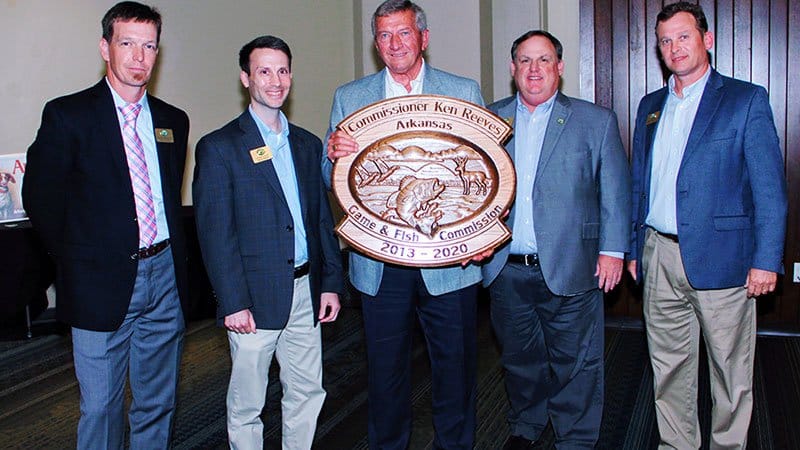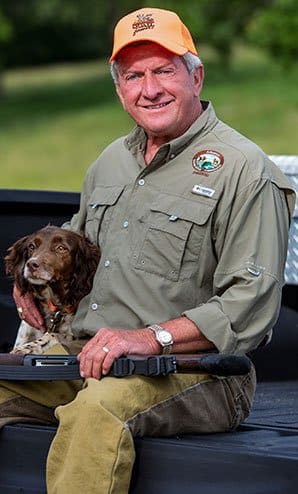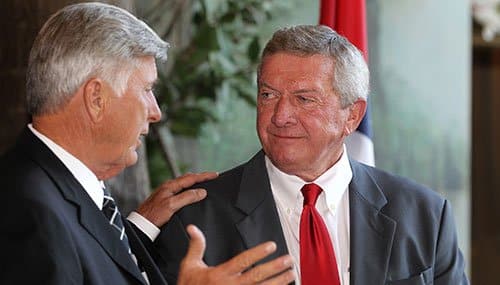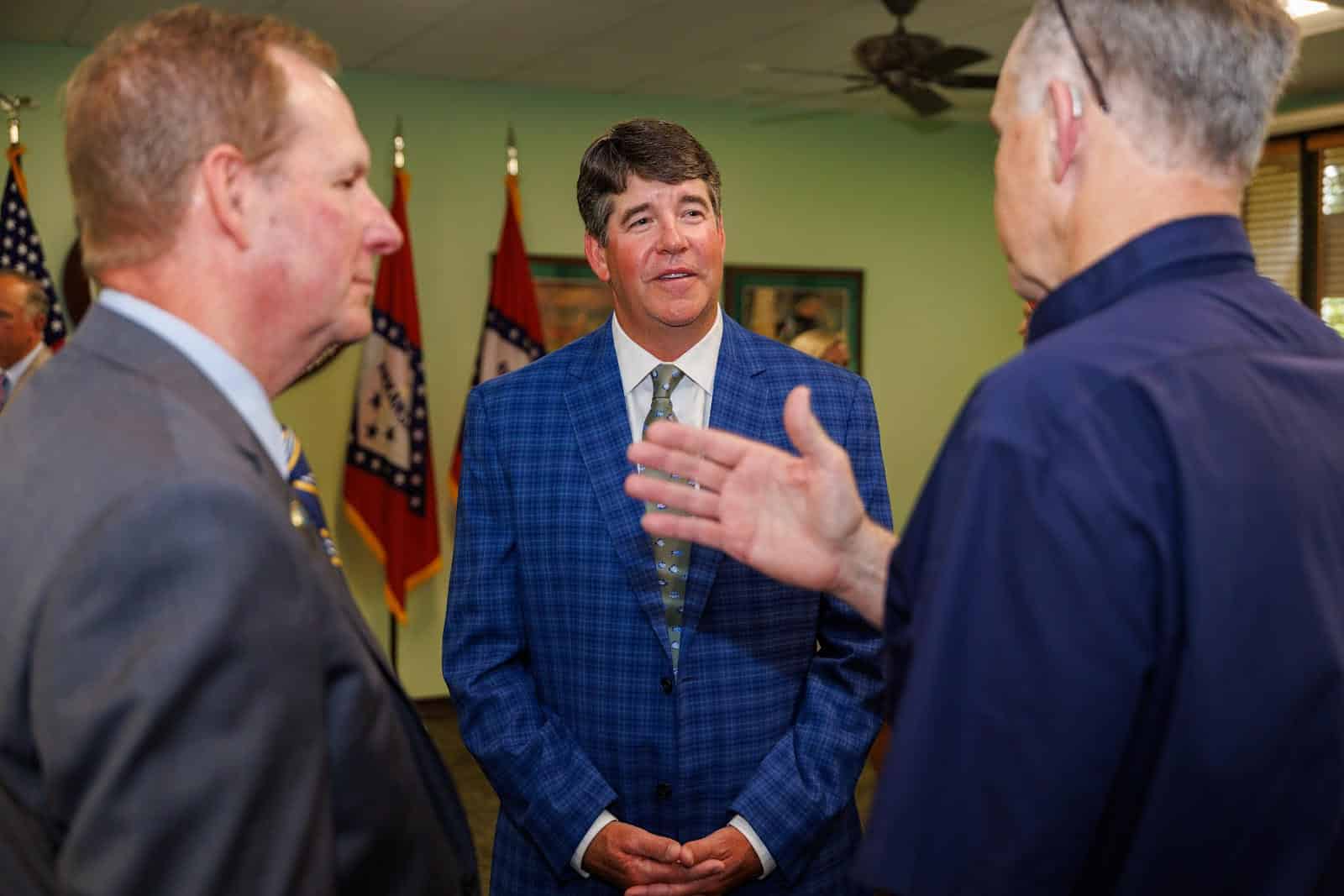Reeves’ time on commission ‘exceeded my expectations’
ON 07-01-2020

July 1, 2020
Randy Zellers
Assistant Chief of Communications

HARRISON — Every Arkansas Game and Fish Commissioner in recent years, it seems, has had to deal with some major, unexpected situation during his one year as chairman. For Ken Reeves, his year leading the commission was affected by a worldwide crisis that arrived this spring and affected every aspect of Arkansans’ lives, and saw the agency headquarters and other offices such as nature centers around the state temporarily shuttered.
“Unfortunately, I will remember this (coronavirus) situation very vividly in my last year on the commission,” Reeves said recently, a few days before he passed the chairman’s gavel on to Andrew Parker as his successor at the June Commission meeting here. “I never dreamed when we had our February meeting in Little Rock that it would be the last meeting I would attend in Little Rock. The sad part of it is, so many people on the staff that I have worked with over the years, I won’t have the opportunity to thank them and say good-bye in person.
“We made accommodations to get our work done,” Reeves said.”But it’s not been as effective as having committee meetings with everyone together. We also had to cancel our public town hall meetings that former Commission Chairman (Ford) Overton had started last year. Those have been priceless, to go out to other areas of state with our leadership and have the public come in and ask us anything they wanted to. We had had big turnouts at those meetings.”
But to Reeves, a 72-year-old retired lawyer from Harrison, the coronavirus pandemic in his last year as a commissioner also showed what the agency is made of. “I want to tip my cap to the education and communications divisions that put out a myriad of offerings during the past three months, like our Virtual Nature Center, when everything shut down,” he said. “The work of the agency has gone on very, very effectively, and that’s because we have a great leadership team and great employees.
“We’ve been getting it done, it’s just not as enjoyable as we might have hoped. But this has been such a wonderful experience.”
Reeves says his experience on the commission “has exceeded my expectations.”
Reeves, appointed to the commission by Gov. Mike Beebe in 2013, said he didn’t come aboard “with an agenda.” But, he said, as he got the lay of the land with the other commissioners, he made sure he “asked a lot of hard questions” of the AGFC staff. Sometimes, the answers he got didn’t jibe with what he expected, Reeves admits. “But I cannot remember a single time that I was right and the staff was wrong.”

He added, “The overarching success during my term has been the same as for the agency for decades. It’s been successful because of the staff. There always will be challenges, but the agency has risen up and conquered those, and it’s because of the talent and dedication of the staff. Commissioners come and commissioners go and we always hope we make a meaningful contribution, but the mission of the agency and the people who work for it are the constants that have made it successful.”
More young people have been exposed to the AGFC’s mission through its shooting sports and archery programs, as well as the outreach in education through nature centers, he said – a fifth nature center will open in Springdale later this year, giving the agency exposure to more than 500,000 people in that region, Reeves said. “We’ve been long overdue in reaching out there.”
Restoration of quail and turkey, with an emphasis on habitat changes to bring those birds back in bigger numbers, became two priorities for Reeves. He pushed for the establishment of a turkey stamp to help generate money for the species’ restoration. Reeves also sought to relax the regulations on hunting predators for better control.
The quail initiative “is very near and dear to my heart,” Reeves said, noting his first hunt with his father 62 years ago. “I guess I’m the only commissioner who still owns a bird dog and remembers when we had great numbers of quail … A lot of people may think it’s a long haul and a waste of money, but I assure you it’s not. It’s now or never for quail. The decline is primarily due to the loss of habitat. When I was a young man, fescue was unheard of and Bermuda wasn’t a farm grass. The places I used to hunt are now full of Black Angus cows, and full of fescue and Bermuda one inch high.”
While nearly 90 percent of Arkansas is privately owned, he noted, “cattle farmers don’t have to have all fescue and Bermuda on their land. In drought conditions around here last year, all that burned up. Just down the way from me, though, Baker Prairie was lush and butterflies were everywhere. It’s full of native warm-season grasses. It shows the contrast. That’s where the cows need to be, and quail and turkeys thrive in native grasses. It’s a matter of educating the people.”
Describing himself as someone who would rather hunt turkey than eat, he said recent regulations changes are helping set the stage for the rebound of the gobbler. He admits, though, that nature still deals Arkansas problems it can’t control, such as the amount of rainfall during the past several springs. Eradication of feral hogs, enhanced in the past year by the State of Arkansas’s consortium of 22 agencies and groups including the AGFC, will also help with the predator problem for turkey survival, he said.
Chronic wasting disease was discovered in north Arkansas a little more than four years ago. For Reeves, it became personal, living in proximity to the outbreak’s epicenter. His regular deer hunting area, a 1,200-acre spread where Boone and Carroll counties meet with Newton County, “is one of the hottest spots for CWD,” he said. It also historically had among the best gene pools for large deer, but that began to change suddenly, he said.
“I have never missed the opening day of deer season,” Reeves said. “I went this year because I never missed, and we had five different food plots on this tract of land. But I knew, from viewing my game camera pictures, by mid-October there were only about six deer on the land there. At one time, this area was as good as it gets. I have only shot one buck in the last 10 years, because it was a nice 10-point. Instead, I would shoot a couple of does for the freezer. There wasn’t any reason to shoot does this year when there were that few deer. The last eight deer killed on this place all tested positive (for CWD). Two were really nice bucks; you’d never dream they were positive.”
So, sure, he said – it has dimmed the enthusiasm for deer hunting among people in his region, Reeves said. But, he added, 2 miles away from his spot, there are hunters who feel like their numbers are fine. “It just gives you an example of how bad it can get. It has thinned our spot out.”
Reeves pushed for improving the turnaround time for CWD testing, and the hope is for more testing done here in the state in the upcoming deer season.
“CWD is going to be around long after I’m gone,” he said. “But I take a lot of comfort in looking at Colorado. They have managed CWD for over 50 years and anyone can still go there to hunt. They have figured out how to manage it. I’m pleased that our deer team is reviewing our CWD management plan and seeing if it needs to be revised.”
Reeves offered some final, parting thoughts about the AGFC. “I think we have to remember that the AGFC is not a for-profit organization. A lot of times, we think about return on investment, but you can’t put a price on the viability of a particular species, be it deer, quail, turkey or songbirds. It’s our mission, our job, to conserve all wildlife and their habitats. A lot of times that entails putting an emphasis on one species at the expense of others. Over the years, we did that on deer, bear and elk. A lot of people think we’re putting too much emphasis on quail or turkey, but everything we do on quail and turkey habitat benefits both game and nongame species.
“When I came on the commission, Fred Brown was one of my mentors. He told me, ‘Ask yourself three things when considering your vote: Is it consistent with our mission; is it good for the resource; is it good for the agency and people who work here? If you can answer yes to all three, you are likely making a good decision.’ I think that should be the mantra for all commissioners, now and hereafter.
“And my third thought: We should never forget to thank the people of Arkansas for supporting the conservation tax. That tax, for 24 years, has made all the difference in what we’ve been able to accomplish.”
Recent News

Arkansas Wildlife Weekly Fishing Report
Jul. 10, 2025

Lonoke aquaculturist named to AGFC
Jul. 10, 2025
Subscribe to Our Weekly Newsletter E-mails
Don’t miss another issue. Sign up now to receive the AGFC Wildlife Weekly Newsletter in your mailbox every Wednesday afternoon (Waterfowl Reports are published weekly during waterfowl season and periodically outside the season). Fishing Reports arrive on Thursdays. Fill in the following fields and hit submit. Thanks, and welcome!
